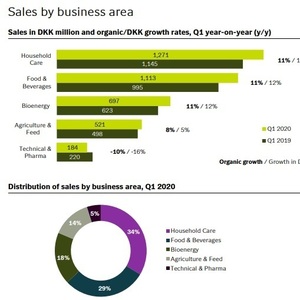Novozymes reports 11% increase in bioenergy sales for Q1

April 29, 2020
BY Erin Krueger
Novozymes released first quarter financial results on April 29. The company reported strong first quarter sales growth for its bioenergy segment, but said factors related to the COVID-19 pandemic make the full-year outlook for bioenergy uncertain.
Novozymes reported a 10 percent overall organic sales growth for the first quarter. The company’s household care and food and beverage segments each grew by 11 percent. Sales for agriculture and feed were up 8 percent, while sales for tech and pharma fell 10 percent.
Bioenergy sales were up 11 percent and accounted for 18 percent of Novozymes’ total sales for first quarter. The company said the bioenergy business performed well and roughly as expected during the period. There were no significant negative impacts during the quarter related to lower gasoline and ethanol demand in the U.S.
Growth in the bioenergy segment was primarily driven by the continued capacity expansion of corn-based ethanol production in Brazil, increased penetration of the company’s yeast technology, and the overall year-on-year growth of the U.S. ethanol market. Novozymes noted the year-on-year improvement in U.S. ethanol production resulted largely from the negative impacts of severe weather that impacted the U.S. Midwest during the first quarter of 2019.
Advertisement
Looking forward, Novozymes said social distancing and stay-at-home orders in the U.S. are lowering gasoline and ethanol demand and creating uncertainty in how the company’s bioenergy business will be impacted for the remainder of the year.
Advertisement
Related Stories
The U.S. Energy Information Administration maintained its forecast for 2025 and 2026 biodiesel, renewable diesel and sustainable aviation fuel (SAF) production in its latest Short-Term Energy Outlook, released July 8.
XCF Global Inc. on July 10 shared its strategic plan to invest close to $1 billion in developing a network of SAF production facilities, expanding its U.S. footprint, and advancing its international growth strategy.
U.S. fuel ethanol capacity fell slightly in April, while biodiesel and renewable diesel capacity held steady, according to data released by the U.S. EIA on June 30. Feedstock consumption was down when compared to the previous month.
XCF Global Inc. on July 8 provided a production update on its flagship New Rise Reno facility, underscoring that the plant has successfully produced SAF, renewable diesel, and renewable naphtha during its initial ramp-up.
The USDA’s Risk Management Agency is implementing multiple changes to the Camelina pilot insurance program for the 2026 and succeeding crop years. The changes will expand coverage options and provide greater flexibility for producers.
Upcoming Events










